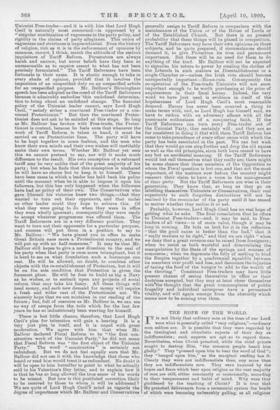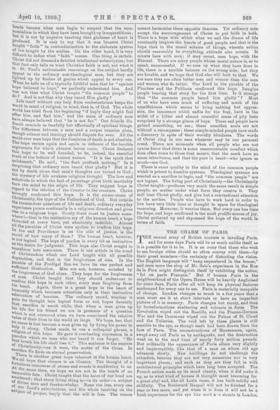THE HOPE OF THE WORLD.
IT is not likely that ordinary men at the time of our Lord were what is generally called "very religious,"—ordinary men seldom are. It is possible that they Wer0 regarded by the theological and ritualistic experts of their day as indifferentists ; such experts are apt so to regard them. Nevertheless, when Christ preached, while the chief priests sought to destroy Him, "the common people heard him gladly." They "pressed upon him to hear the word of God "; they "hanged upon him," as the marginal reading has it. Clearly they were not indifferentiste then, any more than they are indifferentists now. They were haunted by the hopes and fears which bear upon religion as the vast majority of men are still, either constantly or occasionally, according to their temperament and habit of mind. Why were they gladdened by the teaching of Christ? It is true that He preached deliverance from a ceremonial system the bonds of which were becoming unbearably galling, as all religious bonds become when men begin to suspect that the cere- monialism in which they have been brought up is superstitious ; but it is net by negative teaching that gladness of heart 18 Produced. It is easy to say that it was because Christ taught " faith " ha contradistinction to the elaborate system of law taught by the scribes. Ou the other band, it is very difficult to define what "faith" means. One thing is certain. Christ did not demand a detailed intellectual subscription; but that fact only tells us what Christian faith is not, not what it ul• St. Paul's enthusiastic reasonings on the subject hardly aPpeal to the ordinary non-theological man, but they are lighted up by flashes of genius which appeal to every one. When he tells us of a typically faithful man that be "against hope believed in hope," we perfectly understand him. And was not that what Christ taught " the common people" to ao p And is not that why they heard Him gladly ?
Life itself without any help from ecclesiasticism keeps the World in mind of religion, in mind, that is, of God. The whole world has tried from the beginning "if haply they might feel after him, and find him," and the mass of ordinary men L0 always believed that "he is not fur." Our friends die.
beat]] reminds us fearfully but effectually of spiritual things. The difference between a man and a corpse remains plain,
though science and theology should dispute for ever. All the World over men hope that the dominion of death is not absolute. The hope recurs again and again in defiance of the terrible arguments for whioh absence leaves room. Christ declared this Lope to be well founded, to be, indeed, the essential truth at the bottom of human nature. It is the spirit that quiekeneth," He said ; "the flesh profiteth nothing." Is it surprising that ordinary men beard that gladly ? But it is tot by death alone that men's thoughts are turned to God ; the mystery of life awakens religious thought, The love and solicitude to which the fact of parentage gives birth inevitably turn the mind to the origin of life. They suggest hope in regard to the relation of the Creator ho the creature. Christ strop –
gly confirmed this hope. It is the corner-stone of Christianity, the type of the Fatherhood of God. But outside
the tremendous questions of life and death, ordinary everyday experience points continually in a religious direction and gives rise to a religious hope. Surely there must be justice some-
Where l—that is the instinctive cry of the human heart, a hope towarted at every turn, yet absolutely indelible. Almost 1111 the parables of Christ were spoken to confirm this hope.
, the end Providence is on the side of justice, is the !floral of how many of them ? The human heart, however,
18 not logical. The hope of pardon is every bit as instinCtive tta the desire for judgment. This hope also Christ sought to transform into assurance. There is one article in the creed
of Christendom which our Lord taught with all possible dogmatism, and that is the forgiveness of sins. In the Parable of the Prodigal Son we have its one perfect and sufficient illustration. Men are not, however, satisfied by the forgiveness of God alone. They hope for the forgiveness men. Christ taught that they should endeavour to oOnfirm this hope in each other, every man forgiving from bui heart. Again, there is a great hope in the heart of humanity which becomes articulate only in their instinctive admiration of heroism. The ordinary crowd, whether it Pots its thought into logical form or not, hopes devoutly
sth.at .sacrifice is worth while, that when a man gives up life for his friend we are in presence of a question uielis not answered when we have considered the relative value of their lives to the world at large. We hope, too, that 11. cause is lost because a man gives up by dying his power to uelp. it along. Christ made, to use a colloquial phrase, a l'eligion of this hope. He gave it everlasting expression in a
Paradox which no man who has heard it can forget. "He that loveth his life shall lose it." This sentence is the essence 0 Chriatianity,—as it were, the motto of the Cross. In sacrifice He finds an eternal preservation. _ There is another great hope inherent in the human heart. _We all hope that chance is an illusion, The thought of a
rMiultons concourse of atoms and events is maddening to us. iAt the same time, we hope we are not in the hands of an
:exorable fate. Christ taught that the hairs of our head are _ithabered ; that every living thing is—in its order—a subject divine care and foreknowledge. None the less, every one
?ur Lord's exhortations, and Ilia whole teaching on the aubJect of prayer, imply that the will is free. The reason
cannot harmonise these opposite theories. Yet ordinary men accept the encouragement -of Christ to put faith in both. There is a hope with which what we call the drama of life constantly inspires the hearts of good people, and that is the hope that in the moral scheme of things, wherein action should reasonably be everything, attitude also counts. ft counts here with men; it may count, men hope, with the Eternal. There are many people whose moral nature is, so to speak, unsuccessful. If we sum up what they have done in life, there is a terrible balance on the wrong side; but they are lovable, and we hope that God also will look to that. We are sure they are often better men and women than the men and women who do better. Our Lord in the parable of the Pharisee and the Publican confirmed this hope. Imagine people hearing that story for the first time. Is it strange that "the common people heard him gladly"? Most of us who have seen much of suffering and much of the unselfishness which seems to bring nothing but oppres- sion, the innocence which unfits for the fray, have in the midst of a bitter and almost resentful sense of pity been surprised by a strange gleam of hope. These sad people have gained something, we see; these unselfish souls are not without a recompense ; these simple-minded people have made a discovery in spite of their worldly blindness. The words of Christ ring in our ears whatever may be our personal creed. 'There are moments when all people who are not cynics know that there is some unaccountable comfort which does often come to those that mourn, that the meek have no mean inheritance, and that the pure in heart—who ignore so much—see God.
There is some quality in the mind of the common people which is potent to dissolve systems. Theological systems are erected as a sacrifice to logic, and "the Common people" are not logical. The living part of Christianity—the Christianity Christ taught—produces very much the same result in eimple people, no matter under what form they receive it. They still hear Christ gladly, and give but a conventional attention to the scribes. People who have to work hard in order to live have very little time or thought to spare for theological reasoning. Moreover, it wearies them. But every one has time for hope, and hope confirmed is the moit prolific source of joy. Christ gathered up and &pressed the hope of the world, in terms of faith.







































 Previous page
Previous page